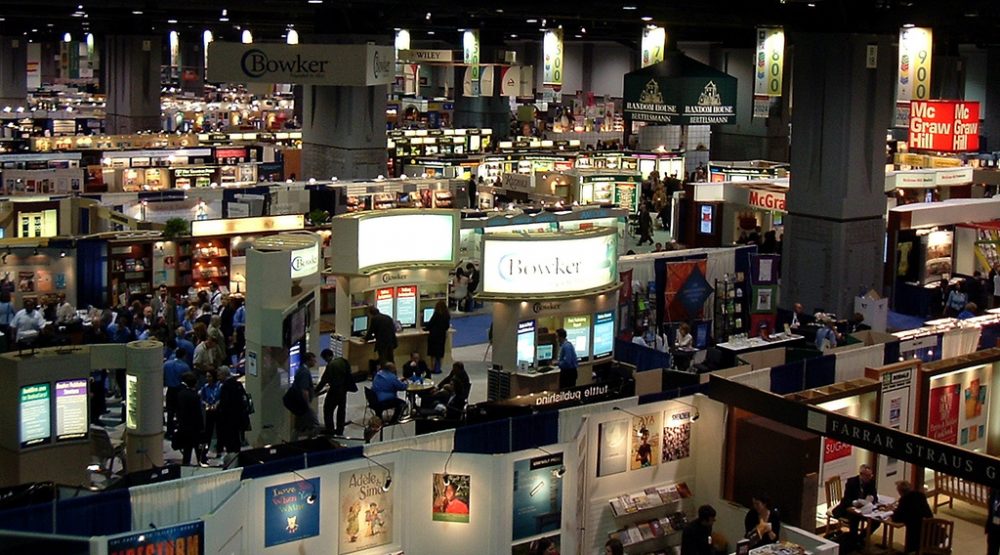 Photo credit: Clarissa Peterson / CC BY-NC-SA
Photo credit: Clarissa Peterson / CC BY-NC-SA
Update (December 2024): In 2012, I wrote an earlier version of this article as a warning to self-published authors who fall prey to scams that take advantage of the highly recognized industry trade show, BookExpo (also known as BEA).
BookExpo no longer exists, but there are other trade shows, especially international trade shows, where the industry gathers. A few of the biggest include Frankfurt Book Fair, London Book Fair, and Bologna Children’s Book Fair.
While these trade fairs do what they can to educate and protect authors from making expensive mistakes, be smart and do your research before you make any trade show (those meant for publishing industry professionals and employees) part of your marketing, publicity, and PR plan. Most authors should not pay for visibility at these shows if they are not in attendance themselves in partnership with a publisher, agency or some other organization.
First, a little background: What are publishing industry trade shows?
Trade shows are large gatherings of publishing industry professionals, primarily publishers, literary agents, book scouts, and people who sell/buy rights or license intellectual property. They are important primarily to large traditional publishers.
The bulk of any trade show consists of an exhibit floor where publishers purchase booth space to show off their upcoming titles (and authors), sell rights, and network with colleagues. There’s typically a separate rights area where literary agents have tables. Important distributors, retailers and service providers may also exhibit or attend.
Do authors attend trade shows?
Yes, but usually at the invitation of their publisher or some other organization—sometimes the trade show itself. Every year, traditional publishers decide what specific titles they want to market at trade shows, and may invite the authors to do signings or events meant to bring visibility to the work pre-publication. Remember that “visibility” in this context means visibility to the trade (the industry), not visibility to consumers.
Sometimes self-publishing authors (typically those who are bestsellers) will also attend because they have rights deals to conduct or otherwise have numerous business partners at the show.
Should authors attend a trade show?
If you’re a professional author with a significant history of sales, and already know of other professionals you could potentially meet and network with, then it may be a good opportunity to attend. However, this is not a good opportunity for an author who has just published their first book, and thinks attending might fix their marketing and promotion problems. It will not.
Most important, trade shows are not a shortcut to getting up close and personal with traditional publishers or literary agents, in the hopes one of them will publish or represent your book. You’ll greatly annoy people if you go pitching on the floor, unless it has to do with subrights or licensing. If that is indeed your goal, you should have a very polished pitch, and demonstrate a successful track record. Best-case scenario: set up meetings in advance and don’t ambush people.
Most trade shows are not interested in unaffiliated authors walking the floor, because every editor/agent hides from the author who is pitching their work, especially self-published work that hasn’t sold well.
Avoid paying to have your book promoted at trade shows
There are a handful of opportunities for self-publishing or independent authors to get visibility for their work at trade shows even if they do not attend. As far as I’m concerned—as someone who attended these shows for 20+ years—it is not worth the investment. Here’s why.
The emphasis of the show is on traditional publishing, rights sales and pre-publication marketing, and does not favor self-published title promotion. These are massive, busy shows where traditional publishing insiders talk to other traditional publishing insiders. Yes, there may be some librarians and booksellers, but they’re rarely paying attention to the places where a self-published book may be showcased or promoted. Nobody is going to notice your book there. Your book is likely to be promoted with many other books, with no way of attracting attention even if someone did pause for a second within 50 feet of your book. Imagine setting a copy of your book down in the world’s largest book fair, and expecting someone to not only notice it, but be entranced by it so much they can ignore 10,000 other things happening at the same time. If you—the author—are not present to advocate for it, your book doesn’t stand a chance. Services that offer to promote your book are rarely, if ever, hand-selling or promoting your book in a meaningful way. But they will be happy to cash your check and say that your book had a “presence” at the show. If you want to satisfy your ego, go ahead. But it’s not going to lead to meaningful sales. (I challenge anyone in the comments to provide evidence that a self-published book gained traction at a trade show because the author paid a fee to secure placement—and the author was not present.)Trade shows are quality events, and they present a legitimate marketing and promotion opportunity for some authors and some books. But for the vast majority of authors, it does not make sense to invest what are likely your limited resources in these shows.












 Bengali (Bangladesh) ·
Bengali (Bangladesh) ·  English (United States) ·
English (United States) ·